Editor:
Brandon Sweet
University Communications
bulletin@uwaterloo.ca
Campuses will open at noon
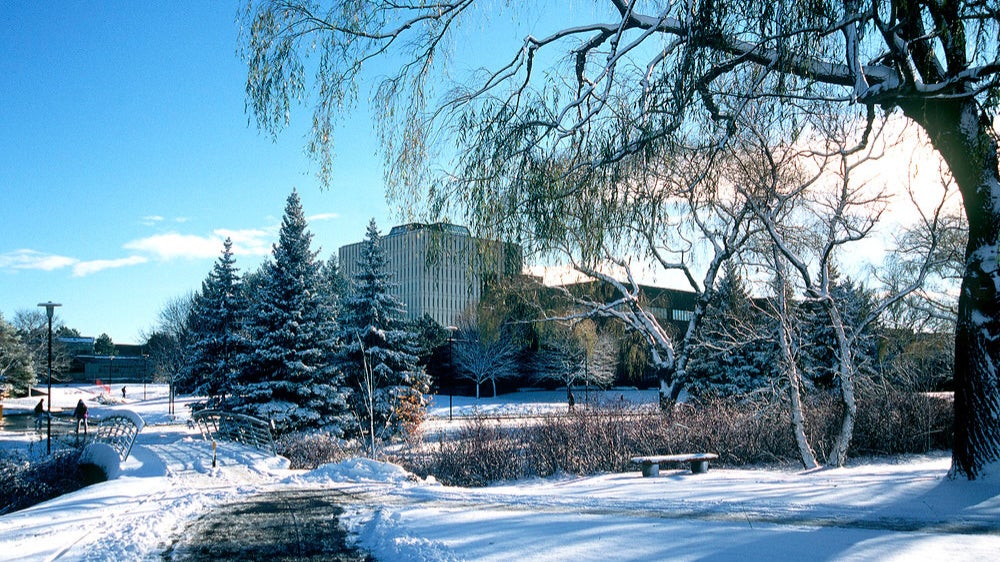
The University of Waterloo's main campus will open at noon and Bright Starts Co-operative Early Learning Centre is closed today. Conditions on the main campus and in our communities remain slippery and could be hazardous in some places. We recommend using caution when moving around outside. Employees who are able to work remotely should consider doing so.
Researcher receives Quantum Horizon funding award

This article originally appeared on Waterloo News.
The Quantum Horizons: Quantum Information Science (QIS) Research and Innovation for Nuclear Science award from the U.S. Department of Energy's Office of Nuclear Physics has enabled a new collaboration between researchers who develop technologies for nuclear physics, quantum information science and high-energy physics.
Adrian Lupascu, a member of the Institute for Quantum Computing and the Department of Physics and Astronomy at the University of Waterloo, is a co-principal investigator (PI) alongside Anne-Marie Valente-Feliciano, an accelerator physicist at the U.S. Department of Energy's Thomas Jefferson National Accelerator Facility. Mustafa Bal, an associate scientist at the U.S. Department of Energy's Fermi National Accelerator Laboratory-hosted Superconducting Quantum Materials and Systems (SQMS) Center, is the lead PI who will coordinate the project "QIS and nuclear physics technologies for next generation materials and architectures for high coherence superconducting qubits" funded by the award.
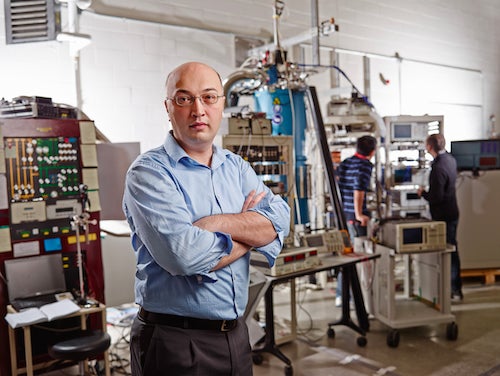
Professor Adrian Lupascu.
This awarded proposal seeks to understand and mitigate the loss of quantum information in quantum systems by a phenomenon called decoherence. The decoherence of qubits — devices that harness fragile quantum information — needs to be tackled to unlock the power of quantum computers fully.
"One of our team's main areas of interest is understanding how well quantum information is preserved in devices. For this process, the quality of materials is essential," Lupascu said. "The film expertise at Jefferson Lab and the collaboration with SQMS will provide an opportunity to explore new physics and advance quantum devices."
Building on Waterloo's experience in designing and measuring different kinds of qubits and the SQMS Center's breadth of expertise and facilities, this award adds Jefferson Lab's capabilities in producing highly pure niobium films.
Cavities made of niobium can accelerate particles to near the speed of light and are the best in the world, but there is room to maintain high performance while reducing costs by depositing a thin film of niobium on a copper cavity.
"We are developing advanced techniques to produce high-quality, niobium-film-based accelerating cavities. We think these films will also improve the lifetime of quantum information in qubits," Valente-Feliciano said. "Most niobium films have impurities and are atomically disordered, which might contribute to the loss of quantum information in qubits. Our research at Jefferson Lab is producing atomically ordered, highly pure films with the best properties and performance."
Lupascu will explore new designs for quantum computing devices made with these films and study the devices' performance at ultra-cold temperatures. This effort will seek ways to produce these devices while maintaining high performance and reproducibility across a range of devices, which is important for the scalability of quantum computers.
"Our SQMS Center is uniquely positioned to make advancements in the performance of superconducting qubits. We will accelerate towards this goal by exploring new promising and unique pathways," Bal said. "Through the Quantum Horizon award, we will use the films made by Jefferson Lab to explore material purity as a potential path to improve qubit performance. The experts at the University of Waterloo will expand our capabilities to make other types of qubits."
The collaboration for this Quantum Horizons award brings together dozens of experts in Quantum Information Science, material science and more to tackle decoherence with the most advanced material analysis tools and qubit foundries.
Disability and the Sustainable Development Goals
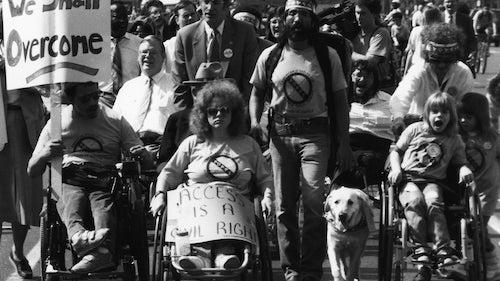
By Jon Parsons. This article was originally published on Waterloo News.
The Sustainable Development Goals (SDGs) were adopted by the United Nations General Assembly in 2015 as a universal call to action to end poverty, protect the planet and ensure that all people enjoy peace and prosperity by 2030.
The 17 goals and their associated targets cover a range of areas including poverty, health, education, gender equality, climate action and more. The University of Waterloo is marking SDG Week, March 6 to 10, with a series of events across campus.
“While Waterloo is celebrating SDG Week and showcasing the excellent research and entrepreneurship rising to the challenge, disability is often forgotten,” says Joyce Barlow, associate director of disability inclusion. “Inclusion and accessibility for disabled people is a key part of any aspirations for equity. But unfortunately, accessibility is often reduced to a technical checklist that needs to be covered off. To ensure equity, we need to strive for authentic inclusion and belonging.”
The SDGs specifically include disability 11 times. Some of the SDGs citing disability are:
No Poverty (Goal 1) – Disabled people are more likely to live in poverty than people without disabilities. They face barriers to accessing education, employment and healthcare, which can limit their economic opportunities. Goal 1 seeks to end poverty in all forms and ensure equal access to economic resources and opportunities for all people.
Good Health and Well-Being (Goal 3) – Disabled people often face barriers to accessing healthcare and may have specific health needs. Goal 3 aims to ensure that all people have access to quality healthcare services, including mental health services, and promote well-being for all.
Quality Education (Goal 4) – Disabled people often face barriers to accessing education, including physical, attitudinal and institutional barriers. Goal 4 seeks to ensure that all people have access to quality education and lifelong learning opportunities.
Gender Equality (Goal 5) – Disabled women and girls face additional barriers to achieving gender equality, including discrimination, violence and limited access to education and employment opportunities. Goal 5 aims to eliminate all forms of discrimination and violence against women and girls and ensure equal access to opportunities and resources.
Decent Work and Economic Growth (Goal 8) – Disabled people often face discrimination in the workplace and may have limited access to employment opportunities. Goal 8 aims to promote sustained, inclusive and sustainable economic growth, full and productive employment and decent work for all, including disabled people.
Reduced Inequalities (Goal 10) – Disabled people face multiple forms of discrimination and may be excluded from social, economic and political life. Goal 10 seeks to reduce inequalities within and among countries, promote social, economic and political inclusion for all and ensure equal opportunities and access to resources for all.
Sustainable Cities and Communities (Goal 11) – Disabled people often face barriers to accessing public spaces and transportation, which can limit their ability to participate in community life. Goal 11 aims to make cities and human settlements inclusive, safe, resilient and sustainable for all, including disabled people.
Climate Action (Goal 13) – Disabled people may be disproportionately affected by climate change, including natural disasters and extreme weather events. Goal 13 aims to take urgent action to combat climate change and its impacts and promote climate resilience and low-carbon development, which can help to protect the rights and well-being of disabled people.
Learn more about the SDGs and disability in the UN flagship report on disability and Sustainable Development Goals.
CEE hosts its first Employer Impact Conference

On February 15, Co-operative and Experiential Education (CEE) hosted its first Employer Impact Conference. The half-day conference saw more than 1,000 employers, prospects and university colleagues registering to hear about the talent evolution from CEE experts, industry leaders and co-op students.
Highlights of the conference included:
- A keynote presentation from Engineering alum Michael Steele
- A panel discussion on how organizations can develop awareness and build capacity to further understand the complexities of Equity, Diversity, Inclusion & Anti-Racism (EDI-R) and Indigenization
- Conversations on how to write an impactful job description and the value of a quality onboarding.
Read the key takeaways from conference speakers on the HireWaterloo website.
Remembering retirees
Human Resources has reported that the following retirees have passed away recently:
- Inga Beamish, who joined St. Paul's College (now United College) in August 1985 and retired in May 1990, died on August 16, 2022;
- Vladimir Dreiseitl, who was hired at the University in August 1971 and retired in July 1995, died on November 13, 2022;
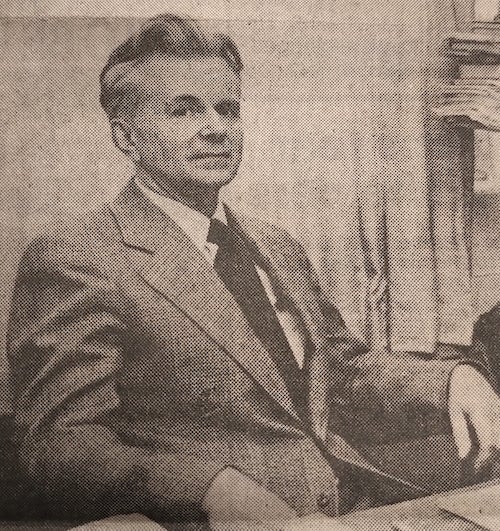
Dr. John Schroeder in 1985.
- Dr. John Schroeder, who started at Waterloo in May 1966 and retired as a Professor of Civil Engineering in April 1988, died on December 21, 2022;
- Distinguished Professor Emeritus Emil Frind, who began working at the University in September 1971 and retired in September 1998 as a Professor in Earth and Environmental Sciences, died on December 25, 2022;
- Edward F. Goodwin, who began working at the University in July 1967 and retired in January 2010 as a Shipper/Receiver in Central Stories, died on December 30, 2022;
- Dr. Michael Smyth, who started his career at Waterloo in July 1975 and who retired from Renison University College in January 2009, died on January 6, 2023;
- Gwen Hinch, who started at Waterloo in November 1975 and retired in March 1994, died on January 6, 2023;
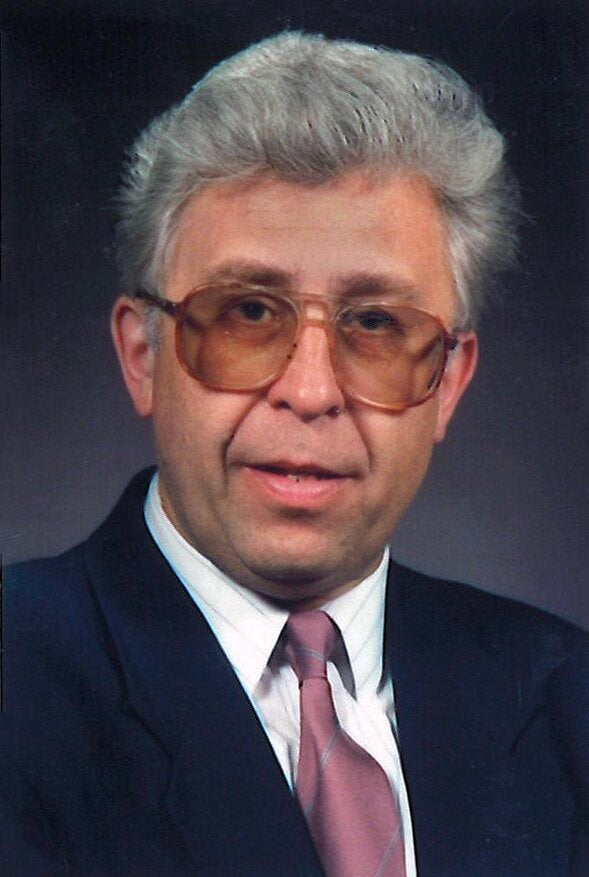
- Distinguished Professor Emeritus Josef Paldus, who began working at the University in December 1968 and retired as Professor in Applied Mathematics, died on January 15, 2023;
- Professor Emeritus Leonard Eckel, who joined Waterloo in July 1981 and retired as a Professor in the School of Accounting and Finance in July 2001, died on January 25, 2023; and
- Elizabeth Trussler, who began working at the University of Waterloo in February 1980 and retired from Food Services in December 1988, died on January 29, 2023.
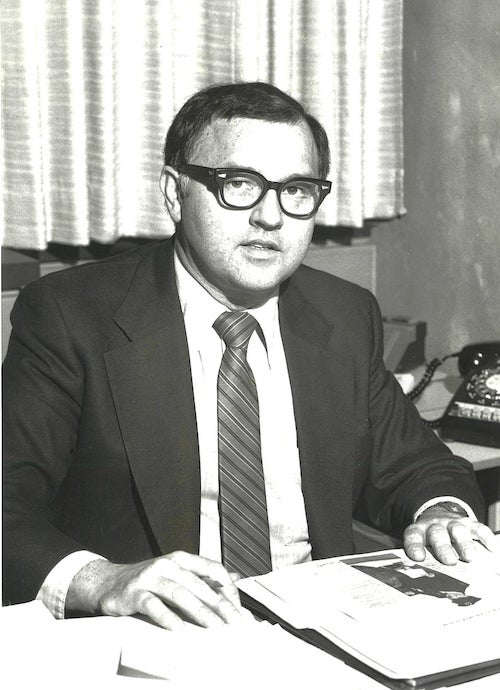
Dr. Leonard Eckel in 1982.
Link of the day
When and Where to get support
Students can visit the Student Success Office online for supports including academic development, international student resources, immigration consulting, leadership development, exchange and study abroad, and opportunities to get involved.
Instructors looking for targeted support for developing online components for blended learning courses, transitioning remote to fully online courses, revising current online courses, and more please visit Agile Development | Centre for Extended Learning | University of Waterloo (uwaterloo.ca).
Faculty, staff, post-doc and graduate student instructors can find upcoming teaching and learning workshops, self-directed modules and recordings of previous events on Centre for Teaching Excellence Workshops and Events page.
Instructors can access the EdTech Hub to find support on Waterloo’s centrally supported EdTech tools. The Hub is supported by members of IST’s Instructional Technologies and Media Services, Centre for Teaching Excellence, Centre for Extended Learning and subject matter experts from other campus areas.
Supports are available for employees returning to campus. Visit IST’s Hybrid Work and Technology guidelines and workplace protocols to assist with the transition.
Students with permanent, temporary and suspected disabilities and disabling conditions (medical conditions, injuries, or trauma from discrimination, violence, or oppression) can register with AccessAbility Services for academic accommodations (classroom accommodations, testing accommodations, milestone accommodations).
Instructors can visit AccessAbility Services' Faculty and Staff web page for information about the Instructor/Faculty role in the accommodation process. Instructors/Faculty members are legally required to accommodate students with disabilities. AccessAbility Services (AAS) is here to help you understand your obligations, and to offer services and resources to help you facilitate accommodations.
Did you know that the Writing and Communication Centre offers many in-person and virtual services to support you with any writing or communication project? This term we've added The Write Spot: a new student space in South Campus hall, complete with bookable workspaces, drop-ins with our peer tutors, and free coffee and tea. We also have one-to-one appointments with our writing and communication advisors and peer tutors, email tutoring for grads and undergrads, drop-ins at Dana Porter Library, online workshops, writing groups, English conversation practice, and even custom in-class workshops. For any communication project, the Writing and Communication Centre is here to support you.
Research Ethics: Find yourself with an ethical question, unsure if your work requires an ethics review, or need advice about putting together a research ethics application? Reach out to one of our friendly staff by booking a consultation or email us with your questions.
Co-op students can get help finding a job and find supports to successfully work remotely, develop new skills, access wellness and career information, and contact a co-op or career advisor.
The Centre for Career Action (CCA) has services and programs to support undergrads, grad students, postdocs, alumni, and employees in figuring out what they value, what they’re good at, and how to access meaningful work, co-op, volunteer, or graduate/professional school opportunities. Questions about CCA's services? Live chat, call 519-888-4047, or stop by our front desk in the Tatham Centre 8:30 a.m. to 4:30 p.m., Monday to Friday.
Drop-in to in-person Warrior Study Halls on Thursdays from 5:00 p.m. to 6:30 p.m. in DC and DP. Join a Peer Success Coach to set goals and work independently or in groups each week.
Renison's English Language Institute continues to offer virtual events and workshops to help students practice their English language skills.
If you feel overwhelmed or anxious and need to talk to somebody, please contact the University’s Campus Wellness services, either Health Services or Counselling Services. You can also contact the University's Centre for Mental Health Research and Treatment. Good2Talk is a post-secondary student helpline available to all students.
The Library is here to help, both in person and online. Our spaces are open for access to book stacks, study spaces, computers/printers, and the IST Help Desk. For in-depth support, meet one-to-one with Librarians, Special Collections & Archives and Geospatial Centre staff. Visit the Library’s home page to access our online resources for anywhere, anytime learning and research.
The Faculty Association of the University of Waterloo (FAUW) continues to advocate for its members. Check out the FAUW blog for more information.
The University of Waterloo Staff Association (UWSA) continues to advocate for its members. Check out the UWSA blog for more information.
The Office of Equity, Diversity, Inclusion & Anti-Racism (EDI-R) works with students, faculty and staff across campus to advance equity and Anti-racism through evidence-based policies, practices and programs. If you have a concern related to Anti-racism and/or equity, please complete our intake form.
The Sexual Violence Prevention and Response Office (SVPRO) supports all members of the University of Waterloo campus community who have experienced, or been impacted, by sexual violence. This includes all students, staff, faculty and visitors on the main campus, the satellite campuses, and at the affiliated and federated Waterloo Institutes and Colleges. For support, email: svpro@uwaterloo.ca or visit the SVPRO website.
The Office of Indigenous Relations is a central hub that provides guidance, support, and resources to all Indigenous and non-Indigenous campus community members and oversees the University's Indigenization strategy.
The Waterloo Indigenous Student Centre, based at United College, provides support and resources for Indigenous students, and educational outreach programs for the broader community, including lectures, and events.
WUSA supports for students:
Peer support - MATES, Glow Centre, RAISE, Women’s Centre - Click on one of the links to book an appointment either in person or online for the term.
Food Support Service food hampers are currently available from the Turnkey Desk 24/7 in the Student Life Centre. Drop-off locations are also open again in SLC, DC, DP, SCH, and all residences.
Co-op Connection all available online.
Centre for Academic Policy Support - CAPS is here to assist Waterloo undergraduates throughout their experience in navigating academic policy in the instances of filing petitions, grievances and appeals. Please contact them at caps@wusa.ca.
WUSA Student Legal Protection Program - Seeking legal counsel can be intimidating, especially if it’s your first time facing a legal issue. The legal assistance helpline provides quick access to legal advice in any area of law, including criminal. Just call 1-833-202-4571.
Empower Me is a confidential mental health and wellness service that connects students with qualified counsellors 24/7. They can be reached at 1-833-628-5589.
GSA-UW supports for graduate students:
The Graduate Student Association (GSA-UW) supports students’ academic and social experience and promotes their well-being.
Advising and Support - The GSA advises graduate students experiencing challenges and can help with navigating university policies & filing a grievance, appeal, or petition.
Mental Health covered by the Health Plan - The GSA Health Plan now has an 80 per cent coverage rate (up to $800/year) for Mental Health Practitioners. Your plan includes coverage for psychologists, registered social workers, psychotherapists, and clinical counselors.
Dental Care - The GSA Dental Plan covers 60 to 70 per cent of your dental costs and by visiting dental professionals who are members of the Studentcare Networks, you can receive an additional 20 to 30 per cent coverage.
Student Legal Protection Program - Your GSA fees give you access to unlimited legal advice, accessible via a toll-free helpline: +1-833-202-4571. This advice covers topics including housing disputes, employment disputes, and disputes with an academic institution.
The Graduate House: Open Monday to Tuesday 11:30 a.m. to 7:00 p.m. and Wednesday to Friday 11:30 a.m. to 9:00 p.m. We’re open to all students, faculty, staff, and community members. The Graduate House is a community space run by the GSA-UW. We’re adding new items to the menu. Graduate students who paid their fees can get discounts and free coffee.
When and Where
Fitness and Personal Training - Registrations opened January 5 this winter with Personal Training and Small Group Training as well as a Free Warrior Workout Program.
Student Health Pharmacy in the basement of the Student Life Centre is now offering Covid booster shots (Pfizer and Moderna) and flu shots. Call 519-746-4500 or extension 33784 for an appointment. Walk-ins always welcome.
Reading Week, Saturday, February 18 to Sunday, February 26.
Equitable Recruitment and Selection, Friday, February 24, 10:00 a.m. to 12 noon, online.
Warriors Women’s Volleyball OUA Quarter-Finals vs TMU, Saturday, February 25, 4:00 p.m., Carl Totzke Court, PAC. Purchase tickets.
Warriors Women’s Hockey OUA Quarter-Finals vs Brock (Game 3 – if necessary), Saturday, February 25, 7:00 p.m., CIF Arena. Purchase tickets.
Warriors Women’s Basketball OUA Quarter-Finals vs TBD, Saturday, February 25, 8:00 p.m., Carl Totzke Court, PAC. Purchase tickets.
Introduction to Disability Justice – Debrief Session, Monday, February 27, 11:00 a.m. to 12 noon, online.
Master of Taxation, Virtual Information Session, full-time program, Tuesday, February 28, 4:00 p.m. To register visit www.uwaterloo.ca/mtax.
Master of Taxation, Virtual Information Session, part-time program, Tuesday, February 28, 5:00 p.m. To register visit www.uwaterloo.ca/mtax.
Introduction to Equity – Debrief Session, Wednesday, March 1, 1:00 p.m. to 2:00 p.m., online.
Intentional Leadership armchair chat with Rose M. Patten, Wednesday, March 1, 1:30 p.m. to 2:30 p.m. Engineering 7 event space, 2nd floor. Register by Thursday, February 23.
NEW - The Long Arm of Theoretical Computer Science: A Case Study in Blockchains/Web3, Distinguished Lecture Series featuring Tim Roughgarden, Computer Science Department, Columbia University, Wednesday, March 1 at 3:00 p.m. in DC 1302.